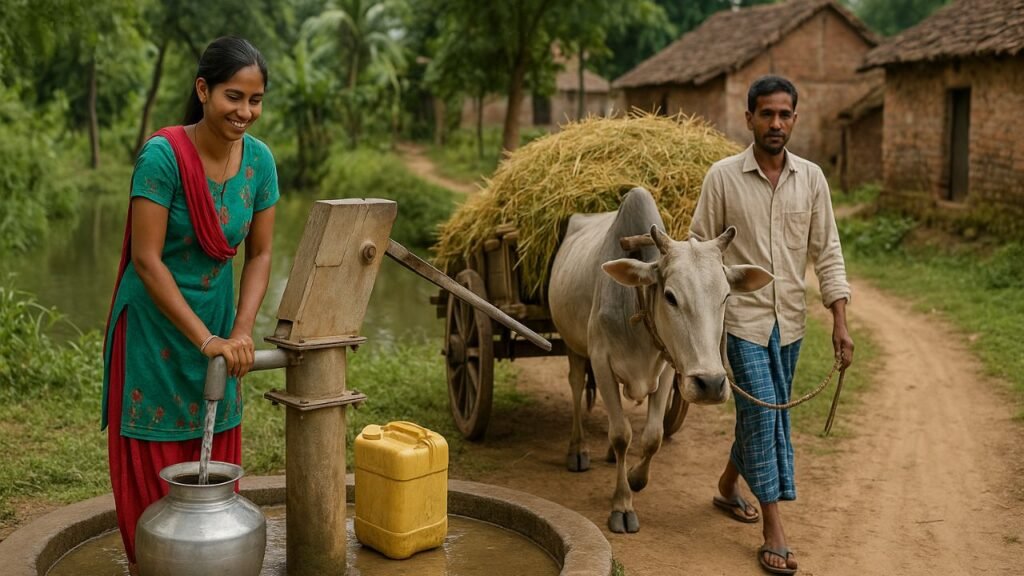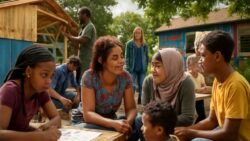UFDP Rural Development – UFDP’s integrated rural development projects focus on transforming the lives of communities by addressing fundamental needs such as clean water, sanitation, education, and livelihood opportunities. Access to clean water is a critical starting point, as it directly impacts health, nutrition, and overall productivity. Many rural areas in India still face challenges related to water scarcity and contamination. Through targeted initiatives like the installation of borewells, water purification systems, and rainwater harvesting projects, UFDP ensures that communities have access to safe drinking water, reducing waterborne diseases and improving the quality of life. In addition to water projects, UFDP emphasizes livelihood support by providing skill development programs, vocational training, and microfinance opportunities to empower individuals to earn sustainable incomes. These programs are designed in partnership with local stakeholders and community members to ensure relevance and long-term impact. By combining infrastructure development with economic empowerment, UFDP creates a holistic approach that addresses multiple dimensions of rural poverty. For more insights on rural development strategies, visit UNDP India and World Bank Rural Development.

 Education for All – UFDP’s Mission to Build Learning Spaces in Underprivileged Communities
Education for All – UFDP’s Mission to Build Learning Spaces in Underprivileged Communities
Access to Clean Water: A Foundation for Rural Prosperity
Providing clean water is not just about health; it is a cornerstone for social and economic development. Communities without reliable water sources face immense challenges, including poor health outcomes, reduced school attendance, and limited agricultural productivity. UFDP addresses these challenges by implementing a combination of short-term and long-term water solutions. Projects include constructing hand pumps, setting up community water filtration units, and educating residents about water conservation and hygiene practices. By integrating water supply projects with community engagement, UFDP ensures that infrastructure is maintained and utilized effectively. The organization also collaborates with local authorities to monitor water quality and prevent contamination. These initiatives help families save time spent fetching water, allowing women and children to focus on education and economic activities. Clean water initiatives have a direct multiplier effect, supporting better nutrition, reducing disease prevalence, and fostering greater community resilience. Learn more about sustainable water solutions at WaterAid Clean Water Programs.
Livelihood Programs: Empowering Rural Communities Economically
Livelihood support is a vital component of UFDP’s integrated rural development approach. Without income-generating opportunities, communities remain trapped in cycles of poverty despite improvements in health and education. UFDP provides skill development workshops, vocational training, and entrepreneurial guidance to help individuals start small businesses or improve employment prospects. Programs include training in agriculture, handicrafts, tailoring, digital literacy, and other locally relevant skills. The organization also facilitates access to microfinance, helping individuals secure loans to expand businesses or purchase necessary equipment. By combining skill development with financial support, UFDP ensures that beneficiaries can achieve sustainable livelihoods and economic independence. Additionally, UFDP encourages community-based cooperatives to promote collaboration, shared resources, and collective growth. These efforts not only improve household income but also strengthen the local economy, creating a ripple effect that benefits the entire community. For global best practices on livelihood programs, visit IFAD Rural Livelihoods.
 Vocational Training, Digital Literacy, and Life Skills Programs Led by UFDP Across Regions
Vocational Training, Digital Literacy, and Life Skills Programs Led by UFDP Across Regions
Education and Capacity Building: Preparing Communities for the Future
Education is a critical pillar of UFDP’s rural development strategy, complementing water and livelihood initiatives. The organization invests in building schools, improving educational infrastructure, and providing teacher training programs to ensure quality learning for children in rural areas. Beyond formal education, UFDP emphasizes capacity building for adults, offering workshops on financial literacy, sustainable farming techniques, and health awareness. By enhancing knowledge and skills, communities are better equipped to manage resources, improve agricultural output, and make informed decisions regarding health and finances. UFDP also runs awareness campaigns on topics such as sanitation, nutrition, and women’s empowerment, fostering social change and inclusivity. These educational initiatives create a strong foundation for long-term development, enabling future generations to thrive and contribute meaningfully to society. Explore additional resources on rural education programs at UNESCO Education Programs.
Holistic Development: Integrating Health, Water, and Economic Growth
UFDP’s integrated approach ensures that rural development is not fragmented but interconnected across multiple sectors. Projects simultaneously target health, water access, education, and livelihoods, creating a synergistic effect that maximizes impact. For instance, clean water initiatives reduce disease, which in turn improves school attendance and workforce productivity. Similarly, livelihood programs increase household income, enabling families to invest in health, nutrition, and education. By adopting a holistic strategy, UFDP addresses both immediate needs and structural challenges that perpetuate rural poverty. Community involvement is central to every initiative, ensuring that interventions are culturally appropriate, locally relevant, and sustainable. This comprehensive model has proven successful in transforming communities across India, providing a blueprint for rural development that balances human welfare, economic growth, and environmental sustainability. To learn more about integrated rural development models, visit UN Rural Development Programs.


